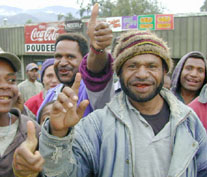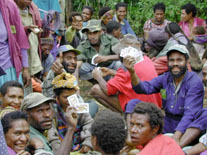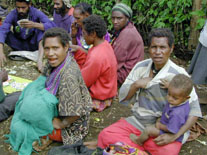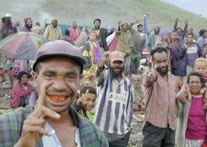Betel Nut in Papua New Guinea
One in an Occasional Series Focusing on South Pacific Customs
I pulled my pack out of my shirt pocket and tossed it onto my desk along with my copy of the Papua New Guinea Post-Courier after arriving back to Tokyo from being out on-assignment for two weeks. It was early morning and the newsroom was still dark. Junior reporter Junko was nowhere to be found. Considering the latter then, things were looking quite bright.
 I turned towards my window and slipped my middle and fore fingers between two slats of my blinds and separated them. The city was resting comfortably.
I turned towards my window and slipped my middle and fore fingers between two slats of my blinds and separated them. The city was resting comfortably.
"Did you accomplish anything while you were gone?" came an anxious female voice from behind. I paused momentarily in acknowledging her call in hopes of increasing her agitation.
I slowly turned and found Junko in my doorway. I separated my hands and turned them upward while simultaneously grinning to give the "Of course, why do you ask?" motion. She responded with the "Because I know better!" crossing of her arms and pursing of her lips. I capitulated and flipped open the newspaper to page 3 featuring the photo from the Miss Papua New Guinea beauty pageant.
She leaned over my desk for a close look. "You must have done something else in PNG other than ogle young girls?" she demanded, while hinting of little anticipated satisfaction in my response by flipping her left hand in my direction.
I took a seat in my recliner and stared directly at her. The sun had just begun to peek between the buildings and light the room from my back. I reached for my lighter.
Our plane departing Mt. Hagen for
Port Moresby was late. In fact, it had yet to arrive at the
airport. This was no surprise; it was an Air Niugini flight.
My driver and I decided to wait in the nearby Hertz parking
lot for the roar of its engines overhead - indicating its
arrival - before going over to the airport departure lounge.
The reason for this was simple; chewing betel nut at the airport
is prohibited. Why that is will be explained shortly. But
the fact is that we had some betel nut that needed to be chewed.
 "Betel nut was popular even before the white man came," my driver said, propped against the tailgate of our Toyota truck. "Mostly in the flat coastal areas of Port Moresby and Lae. That is where it is grown. It didn't become popular in the Highlands until the '70s." He pulled two betel nuts, a plastic bag of lime, and a number of betel peppers from his pocket.
"Betel nut was popular even before the white man came," my driver said, propped against the tailgate of our Toyota truck. "Mostly in the flat coastal areas of Port Moresby and Lae. That is where it is grown. It didn't become popular in the Highlands until the '70s." He pulled two betel nuts, a plastic bag of lime, and a number of betel peppers from his pocket.
But before continuing, a little background...
Flannel shirts and knit hats are the norm. A man's strength is judged by the thickness of his beard. Coca Cola is a luxury. Fog is in the morning, sun in the afternoon, and rain at night. And so goes a typical day in May in PNG's Highlands.
The city of Mt. Hagen sits in the center of the five Highlands provinces that are home to over a million people, sixty languages, and the proper elevation and climate for a world famous coffee industry. The coffee growers have a saying in Pidgin English (the go-between language): Lukautim kopi, na kopi bai lukautim yu (If PNG looks after coffee, coffee will look after PNG). If left to the people of PNG though, it would probably read like this: Just let us look after the betel nut.
Betel nut is perhaps the one unifying element
amongst PNG's numerous cultures, languages (cultural stigmas
concerning inter-marrying amongst its tribes have given rise
to over 700 languages), and topography (coastal marshes, beaches,
mountains, and rainforests).
In enjoying betel nut, lime and betel pepper are chewed together with the white and brown marbled nut of the areca palm. The teeth become black and the lips, gums, and tongue turn a dark red. The taste can be bitter, sweet, spicy and sour and the benefits are said to include: a cure for intestinal diseases, a breath fragrance, and an additive for love.
Since the coastal areas are where betel nut is grown, how does the spark of romance make it up to the lofty and cool cities of the Highlands? In other words: yu kissem we (you get it where)? Good question.
 On any given day, the open markets of Mt. Hagen are flooded with thousands of men, women, and children partaking in the trading of the husk-covered golf ball-sized green (before peeling) nuts. The betel nut, along with other fruits and vegetables, is spread over straw mats by the vendors. The frequent overnight rains that turn the market grounds into mud bogs provide little deterrent to the commerce. Random umbrellas provide shelter. Smoke rises from a few fires and many lit cigarettes. Some folks huddle in groups and play cards. Others hold babies. Still others chat with friends. But all chew betel nut. One kina (30 cents) will bring two betel nut seeds and enough pepper and lime to thoroughly satisfy the most experienced of users.
On any given day, the open markets of Mt. Hagen are flooded with thousands of men, women, and children partaking in the trading of the husk-covered golf ball-sized green (before peeling) nuts. The betel nut, along with other fruits and vegetables, is spread over straw mats by the vendors. The frequent overnight rains that turn the market grounds into mud bogs provide little deterrent to the commerce. Random umbrellas provide shelter. Smoke rises from a few fires and many lit cigarettes. Some folks huddle in groups and play cards. Others hold babies. Still others chat with friends. But all chew betel nut. One kina (30 cents) will bring two betel nut seeds and enough pepper and lime to thoroughly satisfy the most experienced of users.
My driver popped the buai (betel nut) into his mouth and after chewing thoroughly shifted the mashed nut to between his right cheek and teeth.
"First," he said, "you have to chew it all up." He spread his lips to display his work. "Then you add the lime and pepper. But you got to be careful and insert the pepper into the mashed nut. If you don't, you'll burn your lips."
I peeled off the husk and chewed the seed. I immediately noticed an alkaline-like coating on my tongue and inner cheeks. Perhaps similar to tree bark. Dark clouds were rolling in overhead with no sign of the airplane.
I watched him wet the pepper (about the size and shape of a baby's finger) with his tongue and dip it into the bag of lime powder. "If you are cold, betel nut will make you warm. If you are down, it will bring you up." He inserted the pepper into his mashed nut and chewed thoroughly.
I took a pepper, wetted it, and dipped it into the lime. He again warned me about burning my lips. Still no airplane.
"If you arrive at someone's house, it is used as a welcome. Like a cup of coffee or a glass of water." I inserted the white-capped pepper into the mashed nut plugged into my cheek and chewed. The taste kept to that of the end of a battery. His lips and tongue had become a deep red. I looked in the rearview mirror of the Toyota. Mine were the same.
We both then started spitting large, dark red streams onto the parking lot ground. Some landed with big plops right around our feet. Others arced away from the truck and extended a yard or two. This being a necessary byproduct of the ritual, it dictates that the chewing betel nut is banned in certain public places.
"It is said that betel nut brightens the face, quenches hunger, and strengthens the teeth," he said, kicking at the dirt. "I do it more out of tradition than anything else."
 The jet engines roared overhead. That was all I needed to brighten my face.
The jet engines roared overhead. That was all I needed to brighten my face.
With my third smoke securely deposited in my ashtray, I repositioned myself in the stand and eased my Ballantine's stainless steel flask from my jacket pocket in anticipation of questions from the plaintiff.
"So you didn't notice anything while you chewed it?" she asked.
"Nothing special. My driver said that you have to chew it quite often to get a good feeling."
"What about your digestion? Breath? Teeth?" she grinned, knowing full well that some aspects of the witness are irreparable, but went ahead and asked anyway for the amusement of the court.
I smiled, unscrewed the cap, and poured a few fingers of Scotland's best effort from 17 years ago into my coffee cup.
"Nothing in the way of sensory stimulation?" she wondered while crinkling her lower lip.
"Well, as you know," I made a swirling motion with my cup, "I keep myself as sharp as a tack at all times. So it's going to take more than a nut and a couple of spices to take the edge off this traveler." I glanced at my Eisenhower wall portrait for validation.
Typically, at this juncture, I would make a
crass, tasteless, or otherwise improper remark or gesture
to send her fleeing from the courtroom. But I decided on a
new tact: I handed her a bag of Blue Mountain Coffee from
the Highlands. Sure enough, she deserted and the dark cloud
overhead followed. The defense had finally rested.
"You know Ike," I said, "if that hadn't have done it, I was gonna spit a few streams onto the carpet. Would have been a complete waste of perfectly good Scotch but worth it nonetheless."
I could have sworn he winked his approval.
Coming next week: Life during wartime - Kiribati in WWII

